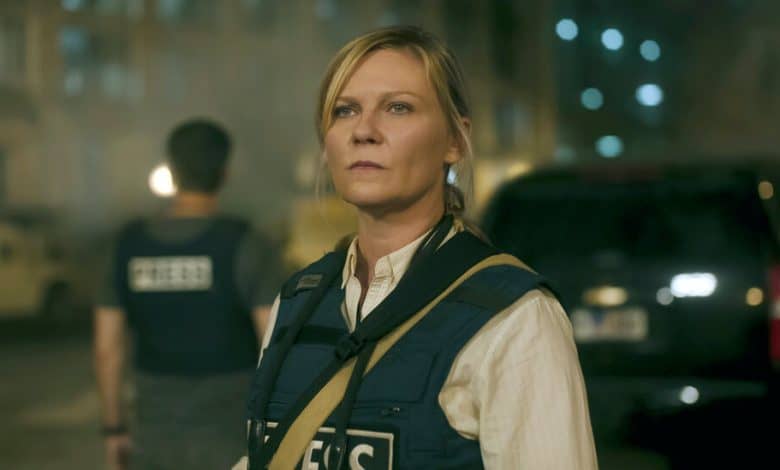‘Civil War’ Review: We Have Met the Enemy and It Is Us. Again.

A blunt, gut-twisting work of speculative fiction, “Civil War” opens with the United States at war with itself — literally, not just rhetorically. In Washington, D.C., the president is holed up in the White House; in a spookily depopulated New York, desperate people wait for water rations. It’s the near-future, and rooftop snipers, suicide bombers and wild-eyed randos are in the fight while an opposition faction with a two-star flag called the Western Front, comprising Texas and California — as I said, this is speculative fiction — is leading the charge against what remains of the federal government. If you’re feeling triggered, you aren’t alone.
It’s mourning again in America, and it’s mesmerizingly, horribly gripping. Filled with bullets, consuming fires and terrific actors like Kirsten Dunst running for cover, the movie is a what-if nightmare stoked by memories of Jan. 6. As in what if the visions of some rioters had been realized, what if the nation was again broken by Civil War, what if the democratic experiment called America had come undone? If that sounds harrowing, you’re right. It’s one thing when a movie taps into childish fears with monsters under the bed; you’re eager to see what happens because you know how it will end (until the sequel). Adult fears are another matter.
In “Civil War,” the British filmmaker Alex Garland explores the unbearable if not the unthinkable, something he likes to do. A pop cultural savant, he made a splashy zeitgeist-ready debut with his 1996 best seller “The Beach,” a novel about a paradise that proves deadly, an evergreen metaphor for life and the basis for a silly film. That things in the world are not what they seem, and are often far worse, is a theme that Garland has continued pursuing in other dark fantasies, first as a screenwriter (“28 Days Later”), and then as a writer-director (“Ex Machina”). His résumé is populated with zombies, clones and aliens, though reliably it is his outwardly ordinary characters you need to keep a closer watch on.
By the time “Civil War” opens, the fight has been raging for an undisclosed period yet long enough to have hollowed out cities and people’s faces alike. It’s unclear as to why the war started or who fired the first shot. Garland does scatter some hints; in one ugly scene, a militia type played by a jolting, scarily effective Jesse Plemons asks captives “what kind of American” they are. Yet whatever divisions preceded the conflict are left to your imagination, at least partly because Garland assumes you’ve been paying attention to recent events. Instead, he presents an outwardly and largely post-ideological landscape in which debates over policies, politics and American exceptionalism have been rendered moot by war.
One thing that remains familiar amid these ruins is the movie’s old-fashioned faith in journalism. Dunst, who’s sensational, plays Lee, a war photographer who works for Reuters alongside her friend, a reporter, Joel (the charismatic Wagner Moura). They’re in New York when you meet them, milling through a crowd anxiously waiting for water rations next to a protected tanker. It’s a fraught scene; the restless crowd is edging into mob panic, and Lee, camera in hand, is on high alert. As Garland’s own camera and Joel skitter about, Lee carves a path through the chaos, as if she knows exactly where she needs to be — and then a bomb goes off. By the time it does, an aspiring photojournalist, Jessie (Cailee Spaeny), is also in the mix.
The streamlined, insistently intimate story takes shape once Lee, Joel, Jessie and a veteran reporter, Sammy (Stephen McKinley Henderson), pile into a van and head to D.C. Joel and Lee are hoping to interview the president (Nick Offerman), and Sammy and Jessie are riding along largely so that Garland can make the trip more interesting. Sammy serves as a stabilizing force (Henderson fills the van with humanizing warmth), while Jessie plays the eager upstart Lee takes under her resentful wing. It’s a tidily balanced sampling that the actors, with Garland’s banter and via some cozy downtime, turn into flesh-and-blood personalities, people whose vulnerability feeds the escalating tension with each mile.